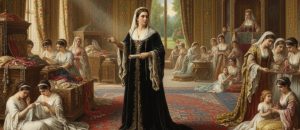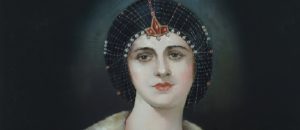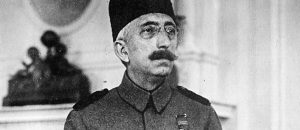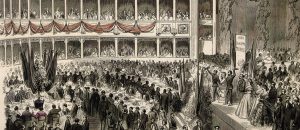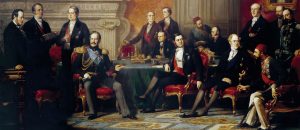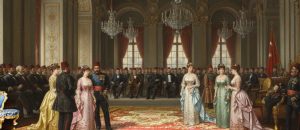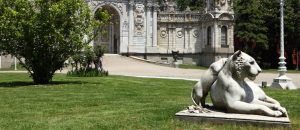Overshadowed by political epithets such as “The Red Sultan” or “The Great Khan,” Sultan Abdulhamid II was also a master carpenter who worked for hours in his workshop at Yıldız Palace, and an avid fan of detective novels, listening passionately to the Sherlock Holmes adventures that he had translated for him at night. These two surprising and human aspects offer invaluable clues for understanding the complex character, disciplined mindset, and worldview behind his authoritarian and mysterious political identity. Carpentry and his passion for detective fiction were not only ways for the Sultan to escape the stress of politics but also mental training grounds where he honed his analytical thinking skills. [Link: The life and era of Sultan Abdulhamid II -> /camdan-saray-demir-irade-sultan-ii-abdulhamid-dolmabahceyi-neden-terk-edip-yildiza-kapandi].
The Workshop at Yıldız Palace: A Master Craftsman
Sultan Abdulhamid II’s interest in carpentry began when he was a young prince and developed into a serious passion that continued throughout his reign. Within the Yıldız Palace complex, he had a fully equipped carpentry workshop (Tamirhane-i Hümayun – Imperial Repair House) established for himself, furnished with the latest technology tools. This was the Sultan’s personal refuge where he escaped the intense stress of state affairs, cleared his mind, and relaxed by producing tangible objects with his own hands. However, this was not just a hobby; the Sultan had achieved a true level of mastery in his craft.
The works he produced carry important clues about his character:
- Functionality and Simplicity: The furniture he produced (tables, chairs, cupboards, screens) generally had a simpler, sturdier, and more functional aesthetic, differing from the overly ornate Rococo style of Dolmabahçe. This reflects his practical and utilitarian worldview.
- The Art of Mother-of-Pearl Inlay (Tarsia): He created unique pieces by combining simple forms with the traditional Ottoman art of mother-of-pearl inlay (tarsia). This demonstrates his ability to synthesize the modern and the traditional.
Diplomatic Gifts: The Sultan would send some items he made with his own hands as gifts to foreign heads of state. For instance, the mother-of-pearl inlaid tables he gifted to German Emperor Wilhelm II and Queen Victoria of England were not merely presents but subtle tools of diplomacy, carrying the message: “I am not just a politician, but also a craftsman respected by Westerners”.
The Passion for Sherlock Holmes: An Analytical Mind
Another lesser-known passion of Sultan Abdulhamid II was his admiration for the legendary detective character Sherlock Holmes, created by Sir Arthur Conan Doyle. The Sultan would have all of Sherlock Holmes’s adventures instantly translated by the palace mütercims (translators) and requested them to be read to him before going to bed at night. This admiration went so far that he honored the author, Arthur Conan Doyle, with the Order of the Medjidie (Mecidiye Nişanı) in 1907 and expressed his wish to meet him personally.
This passion carries deeper meanings than simple entertainment:
- Analytical and Rational Thought: Sherlock Holmes’s ability to solve complex cases using logic and powers of observation, starting from the smallest clues, shows a great parallel with the Sultan’s own mindset. The Sultan, too, thanks to [Link: the extensive intelligence network he established (Hafiye Teşkilatı – Secret Service) -> /padisahin-gormeyen-gozleri-sultan-ii-abdulhamidin-hafiye-teskilati-ve-saraydan-yonetilen-istihbarat-agi], tried to solve major political conspiracies by combining the smallest fragments of incoming information. Detective novels served as mental exercises for him.
- Belief in Order: Underlying detective novels is the belief that even the most complex crime will eventually be solved and order will be restored. This idea was highly appealing to a sultan constantly grappling with conspiracies and crises, who prioritized order and stability above all else.
- Interest in Modern Science: The Sherlock Holmes character employs modern scientific methods such as chemistry and ballistics when solving cases. The Sultan’s fondness for this character also reflects his interest in modern science and technology.
Two Faces of a Personality: The Craftsman and the Detective
Sultan Abdulhamid II’s identities as a carpenter and a detective fiction reader are two important elements that complement his political personality. Carpentry taught him patience, planning, attention to detail, and meticulously managing a project from start to finish. His passion for detective fiction, on the other hand, honed his analytical thinking, skepticism, and the ability to evaluate even the smallest clues. These two characteristics form the basis of the complex and controlled politics he pursued throughout his 33-year reign. With the hands that shaped wood in his workshop, he also attempted to subtly shape the fate of the empire on the political stage.
Conclusion
In conclusion, Sultan Abdulhamid II’s passion for carpentry and detective novels demonstrates that he possessed a multi-layered and complex character, far beyond one-dimensional definitions like “The Red Sultan” or “The Great Khan”. These human aspects reveal his disciplined, analytical, patient, and detail-oriented mindset. His workshop at Yıldız Palace and the Sherlock Holmes stories he listened to at night were personal sanctuaries where the most powerful man of an empire sought refuge from the cruel world of politics, yet simultaneously honed himself for that world.








